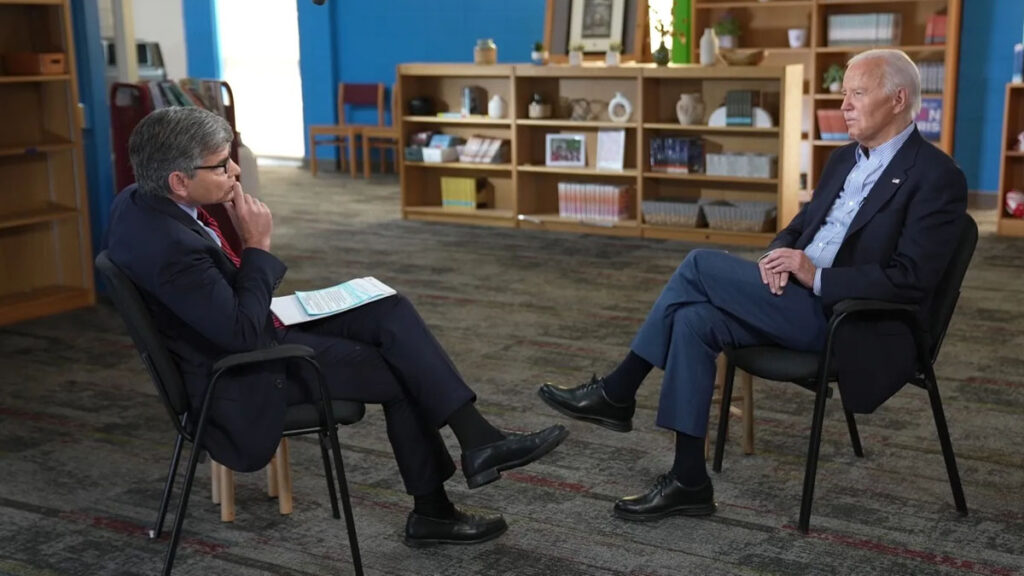President Biden’s interview with ABC’s George Stephanopoulos was billed as a “make or break” moment. It never was that. If Biden had repeated his debate performance, it might have broken the back of his campaign, but no matter how he did, one interview would never be enough to restore public and political class confidence in his ability to win the election and serve four years. If that is even possible, it will take more performances and more time.
If the interview had any impact on the central issue of Biden’s competence to carry on – and ability to win in November — it arguably hurt him more than it helped him. It elicited more media and political criticism than praise. The effort to make Biden look younger through cosmetology (the sudden tan?) and the open-neck polo shirt was too obvious. His voice was still weak. His delivery lacked a certain ease.
And there were those moments. The most significant concern and crisis came over notable gaffes. At one point, Stephanopoulos asked a simple question. Had Biden watched the debate? He pondered, then said, “I don’t think so …no.” Biden was hesitant? He could not clearly recall if he had watched a video of his debate performance. Ask any American on the street today if they had seen the debate – the hottest news subject for a week – they would know without a moment of hesitation if they had or had not.
When asked about the polls that predominantly show him losing to Trump, Biden claimed he was winning in the polls. He went beyond saying the polls are wrong – the boilerplate response for a candidate in his position – but he claimed that he was ahead in the published polls – that he was not hurt by his admittedly poor performance in the debate. Was he unable to recall all the media reports – or was he lying against obvious facts for some reason?
When Stephanopoulos noted that no presidential candidate with Biden’s low favorability rating (36%) had ever won, the President simply disputed the accuracy of the number.
Team Biden was quick to call the ABC interview a success – proof that Biden is not having any cognitive issues. Without doubt, the President performed far better than in the debate, but not enough to assuage concerns – or silence the calls for him to step down.
Such Democrat stalwarts as David Axelrod described the interview as “sad.” He said Biden’s “portrait of where he is in this race doesn’t comport with reality.” He accused Biden of “denial, delusion and defiance.”
The Stephanopoulos interview did not stop more Democrat congressmen from calling for Biden to drop out – and there may be more to come. It does not appear to have quelled the predominantly negative commentary on hitherto friendly media. It has not reversed the majority of Democrat voters who favor replacing Biden with an alternative candidate.
Stephanopoulos’s interview was just one of a series of events designed to restore confidence in Biden’s mental abilities. They are not all pointing in one direction. Following a robust tally following the debate, Biden gave an interview in which he confused HIMSELF with Vice President Harris, saying, “By the way, I’m proud to be, as I said, the first vice president, first Black woman… to serve with a Black president.”
The revelations keep coming. His cheat sheets were leaked from the White House. They now include photos of the way to the stage in the White House with instructions to “walk to podium.” This after 50 years in politics and almost 12 years in the White House?
One of the common questions is: What does Biden need to do to assure the public of his capabilities? The answer is simple. He should take cognitive testing as Dr, Gupta suggests. He refuses – and that says a lot.
What Biden’s defenders – who want him to stay the course – fail to appreciate is that Biden is a mortally wounded candidate. His campaign will come to an end with a withdrawal now or a defeat in November. CNN’s Michael Smerconish says it is no longer an “if” but a “when” he withdraws. That appears to be a growing consensus.
So, there ‘tis.
